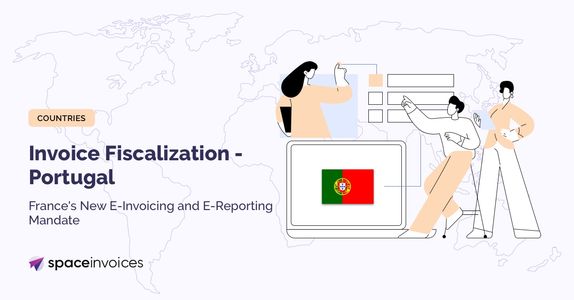Invoice Fiscalization - Portugal
In this article, we will delve into the concept of fiscalization in Portugal, exploring its purpose, regulations, and the implications it has for businesses operating within its borders.
Portugal has implemented fiscalization as part of its tax system, recognizing the importance of combating tax evasion, improving transaction reporting accuracy, and streamlining business processes. Fiscalization has become a crucial aspect of tax compliance in the country, imposing specific requirements on businesses. In this article, we will delve into the concept of fiscalization in Portugal, exploring its purpose, regulations, and the implications it has for businesses operating within its borders. We will also present potential solutions for automating fiscalization and tax compliance using powerful invoicing APIs tailored to SaaS and internet businesses.
What is Fiscalization?
Fiscalization, in general, involves the integration of technology and legal frameworks to ensure compliance with tax regulations, combat tax evasion, and enhance transparency in financial transactions. Here is a helpful overview of fiscalization requirements in Europe, country-specific requirements, future trends to monitor, and API solutions available to dramatically improve productivity for companies that want to be tax compliant.

Fiscalization in Portugal
Fiscalization in Portugal refers to the process of electronically issuing and reporting fiscal invoices. It involves generating unique codes for each transaction and transmitting relevant data to the Portuguese tax authorities in real-time or periodically.
Legal Framework
The legal framework for fiscalization in Portugal is primarily governed by the Portuguese Tax Authority (Autoridade Tributária e Aduaneira). Businesses in Portugal must comply with specific technical standards and requirements when issuing electronic invoices. These invoices are then submitted to the tax authorities for verification.
Technical Requirements
To comply with fiscalization regulations, businesses in Portugal must issue electronic invoices in the standardized format required by the Portuguese Tax Authority. The invoices should include specific details and adhere to the technical standards outlined by the tax authorities. This ensures accurate reporting and transparency in financial transactions.
Penalties for Non-Compliance
Failure to comply with fiscalization requirements in Portugal can result in significant penalties, including fines and potential legal consequences. It is essential for businesses to understand the implications of non-compliance and take appropriate measures to meet the fiscalization obligations.

Future Developments
Fiscalization regulations in Portugal are subject to ongoing developments, adapting to evolving technologies and business practices. As digitalization progresses, new requirements, such as advanced electronic invoicing and real-time reporting, may shape the future landscape of fiscalization practices in the country.
Fiscalization for SaaS and Online Businesses
SaaS companies in Portugal should consult with local tax authorities or professionals to ensure compliance with relevant tax regulations based on their specific business activities. Understanding and fulfilling the fiscalization obligations specific to Portugal is crucial for SaaS and online businesses operating in the country.
Solutions for Automated Invoice Fiscalization Using a Single API
Implementing the fiscalization requirements can be complex and require constant monitoring for changes. A common solution is to leverage a unified API integrated with SaaS or server software to automate the fiscalization process. Space Invoices is a market leader in API-based fiscalization. Additionally, there are online invoicing applications that automate fiscalization for freelancers or small businesses with a relatively low volume of monthly invoices.

Conclusion
Invoice fiscalization requirements in Europe play a vital role in promoting tax compliance, combating tax fraud, and enhancing transparency. By understanding the specific requirements of each country and leveraging API-based solutions like Space Invoices, businesses can streamline compliance processes, generate compliant invoices, and ensure timely reporting. As fiscalization and e-invoicing continue to evolve, staying informed about future trends will be crucial for companies to adapt and thrive in the changing regulatory landscape.
Additional reading:
Start issuing Invoices, free!
Signup and start issuing compliant invoices from your software in minutes.
Or contact us to get a free implementation consultation.
